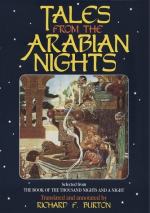Maccovius and the Synod of Dort:—Good works
are an obstacle to salvation. God does by no
means will the salvation of all men: he does will
sin and he destines men to sin, as sin? What would
they think of the Inadmissible Grace, the Perseverance
of the Elect, the Supralapsarian and the Sublapsarian
and, finally, of a Deity the author of man’s
existence, temptation and fall, who deliberately pre-ordains
sin and ruin? “Father Cohen” carries
out into the regions of the extreme his strictures
on the one grand vitalising idea of Al-Islam, “There
is no god but God;"[FN#336] and his deduction concerning
the Pantheism of Force sounds unreal and unsound,
compared with the sensible remarks upon the same subject
by Dr. Badgers[FN#337] who sees the abstruseness of
the doctrine and does not care to include it in hard
and fast lines or to subject it to mere logical analysis.
Upon the subject of “predestination” Mr.
Palgrave quotes, not from the Koran, but from the
Ahadis or Traditional Sayings of the Apostle; but what
importance attaches to a legend in the Mischnah, or
Oral Law, of the Hebrews utterly ignored by the Written
Law? He joins the many in complaining that even
the mention of “the love of God” is absent
from Mohammed’s theology, burking the fact that
it never occurs in the Jewish scriptures and that
the genius of Arabic, like Hebrew, does not admit
the expression: worse still, he keeps from his
reader such Koranic passages as, to quote no other,
“Allah loveth you and will forgive your sins”
(iii. 29). He pities Allah for having “no
son, companion or counsellor” and, of course,
he must equally commiserate Jehovah. Finally his
views of the lifelessness of Al-Islam are directly
opposed to the opinions of Dr. Leitner and the experience
of all who have lived in Moslem lands. Such are
the ingenious but not ingenuous distortions of fact,
the fine instances of the pathetic fallacy, and the
noteworthy illustrations of the falsehood of extremes,
which have engendered “Mohammedanism a Relapse:
the worst form of Monotheism,"[FN#338] and which have
been eagerly seized upon and further deformed by the
authors of popular books, that is, volumes written
by those who know little for those who know less.
In Al-Rashid’s day a mighty change had passed
over the primitive simplicity of Al-Islam, the change
to which faiths and creeds, like races and empires
and all things sublunary, are subject. The proximity
of Persia and the close intercourse with the Graeco-Romans
had polished and greatly modified the physiognomy of
the rugged old belief: all manner of metaphysical
subtleties had cropped up, with the usual disintegrating
effect, and some of these threatened even the unity
of the Godhead. Musaylimah and Karmat had left
traces of their handiwork: the Mutazilites (separatists
or secessors) actively propagated their doctrine of
a created and temporal Koran. The Khariji or Ibazi,
who rejects and reviles Abu Turab (Caliph Ali), contended
passionately with the Shi’ah who reviles and




